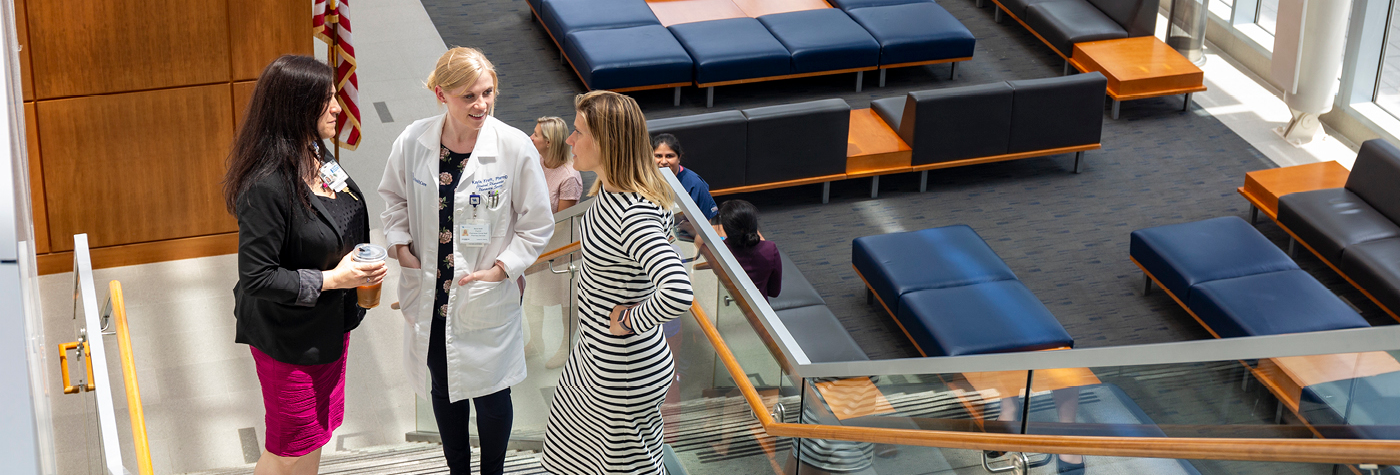'It Takes A Team'
Pharmacists and physicians collaborate closely to optimize outcomes
Medicine requires a team – this is one of the reasons that providers of both cardiovascular care and clinical pharmacy practice are working closer together at UK Gill Heart & Vascular Institute. UK HealthCare’s patients are among the sickest in the nation, and their complex conditions demand the more collaborative and nimble approach to care that the integration of cardiovascular medicine and clinical pharmacy enables. This partnership not only improves transitions in care but also lengthens the time that patients stay healthy and out of the hospital after procedures.
“It’s about holistically looking at the whole patient and then utilizing everyone on the team – including pharmacists – to practice at the top of their license and to reach better outcomes for the patients together,” said Dr. Craig Beavers. Beavers is a cardiovascular clinical pharmacist and chair of the American College of Cardiology cardiovascular teams council.
“That means allowing pharmacists to have a broad scope of involvement in various activities,” Beavers continued. “That may include having collaborative practice agreements where the pharmacist can make dose adjustments or start and stop meds based on protocol. In this way, pharmacists can bring to bear the knowledge and skills of our professional background and better manage a particular issue that we're specially trained in. At the same time, it allows the physician to deal with more complex issues. All of these things help improve outcomes.”
UK HealthCare has the most Board of Pharmacy Specialties (BPS) board-certified cardiology pharmacists of any hospital in Kentucky. The BPS Board Certified Cardiology Pharmacist credential identifies pharmacists who “specialize in the delivery of direct patient care, as members of interprofessional healthcare teams, working to ensure safe and effective use of medications in patients with cardiovascular disease.”
At the forefront of advanced care
Additionally, UK is respected as one of the places where the concept of clinical pharmacy services took root. Integration, investment and support for clinical pharmacy has developed throughout UK HealthCare over decades. This is evidenced by UK HealthCare’s establishment of a clinic for post-acute coronary syndrome that is completely run by pharmacists.
“Internal data shows that if we see a patient within the first seven days of their discharge – if we re-educate them, make sure they’re not having any issues or symptoms, do some physical assessment – we can help reduce readmissions within the first 30 or 90 days,” Beavers said. “We're able to maximize and optimize the care of the patient. That's an advanced, innovative practice that doesn't exist in a lot of places.”
Helping beyond the hospital
In addition, a highly active student group is committed to community outreach around clinical pharmacy services. UK pharmacy students have founded their own committee of the American Pharmacists Association-Academy of Student Pharmacists (AphA-ASP) Operation Heart initiative. The students put on free local and regional events to screen patients for warning signs of heart disease, such as high blood pressure, high blood glucose and high cholesterol and teaching CPR. The UK students are multi-year winners of the AphA-ASP regional Operation Heart award.
UK Gill Heart & Vascular Institute even incorporates clinical pharmacy in its strategic organizational planning, which has influenced operations, such as research and quality initiatives.
“If you have a culture that recognizes the value and is willing to invest, it clearly pays dividends in the long run for the hospital, health system and their patients,” Beavers said. “There is an understanding here that it takes a team to optimize outcomes.”

